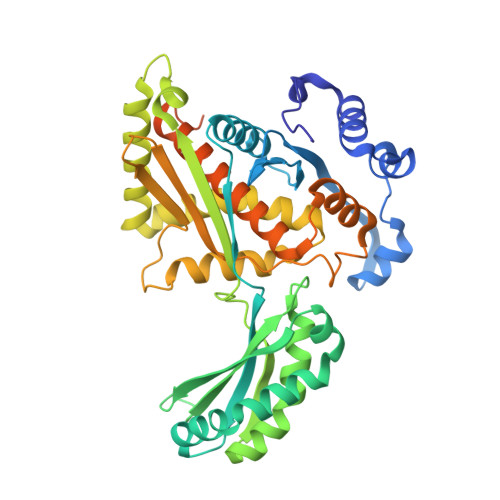pH-dependent reaction triggering in PmHMGR crystals for time-resolved crystallography.
Purohit, V., Steussy, C.N., Rosales, A.R., Critchelow, C.J., Schmidt, T., Helquist, P., Wiest, O., Mesecar, A., Cohen, A.E., Stauffacher, C.V.(2024) Biophys J 123: 622-637
- PubMed: 38327055
- DOI: https://doi.org/10.1016/j.bpj.2024.02.003
- Primary Citation of Related Structures:
8GDN, 8SZ6, 8VLQ - PubMed Abstract:
Serial crystallography and time-resolved data collection can readily be employed to investigate the catalytic mechanism of Pseudomonas mevalonii 3-hydroxy-3-methylglutaryl (HMG)-coenzyme-A (CoA) reductase (PmHMGR) by changing the environmental conditions in the crystal and so manipulating the reaction rate. This enzyme uses a complex mechanism to convert mevalonate to HMG-CoA using the co-substrate CoA and cofactor NAD + . The multi-step reaction mechanism involves an exchange of bound NAD + and large conformational changes by a 50-residue subdomain. The enzymatic reaction can be run in both forward and reverse directions in solution and is catalytically active in the crystal for multiple reaction steps. Initially, the enzyme was found to be inactive in the crystal starting with bound mevalonate, CoA, and NAD + . To observe the reaction from this direction, we examined the effects of crystallization buffer constituents and pH on enzyme turnover, discovering a strong inhibition in the crystallization buffer and a controllable increase in enzyme turnover as a function of pH. The inhibition is dependent on ionic concentration of the crystallization precipitant ammonium sulfate but independent of its ionic composition. Crystallographic studies show that the observed inhibition only affects the oxidation of mevalonate but not the subsequent reactions of the intermediate mevaldehyde. Calculations of the pKa values for the enzyme active site residues suggest that the effect of pH on turnover is due to the changing protonation state of His381. We have now exploited the changes in ionic inhibition in combination with the pH-dependent increase in turnover as a novel approach for triggering the PmHMGR reaction in crystals and capturing information about its intermediate states along the reaction pathway.
- Department of Biological Sciences, Purdue University, West Lafayette, Indiana.
Organizational Affiliation:



















